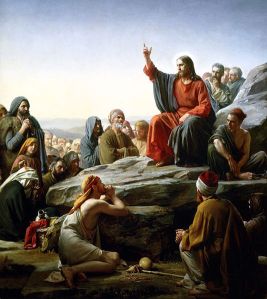
Someone else is running the show.
I don’t know about you, but lately I really need to be reminded of this.

Someone else is running the show.
I don’t know about you, but lately I really need to be reminded of this.
 Every Christian person, by virtue of their Baptism, is called to participation in the life of the Church. This participation sometimes may take the form of a vocation to the priesthood or to religious life. For those not called in that particular way, we have both the right and the duty to participation in the lay apostolate.
Every Christian person, by virtue of their Baptism, is called to participation in the life of the Church. This participation sometimes may take the form of a vocation to the priesthood or to religious life. For those not called in that particular way, we have both the right and the duty to participation in the lay apostolate.
“Since, like all the faithful, lay Christians are entrusted by God with the apostolate by virtue of their Baptism and Confirmation, they have the right and duty, individually or grouped in associations, to work so that the divine message of salvation may be known and accepted by all men throughout the earth. This duty is the more pressing when it is only through them that men can hear the Gospel and know Christ. Their activity in ecclesial communities is so necessary that, for the most part, the apostolate of the pastors cannot be fully effective without it.” (CCC 900)
The lay apostolate does not mean that lay people should do everything in the Church, and it certainly isn’t a call to do the things that are reserved to a priest. The ministry of the priesthood is a ministry to the baptized faithful; the lay apostolate is a ministry to the greater society. Sometimes the laity’s ministry includes service to their parish, in roles that are appropriate to their state in life. Often, the laity serve in many ways outside of their parish Church, in social ministries. Whatever the particular ministry is, it must always be in conformity with the Gospel and the teaching of the Church.
“Social action can assume various concrete forms. It should always have the common good in view and be in conformity with the message of the Gospel and the teaching of the Church. It is the role of the laity ‘to animate temporal realities with Christian commitment, by which they show that they are witnesses and agents of peace and justice.’ (CCC 2442)
There are many opportunities in your parish for lay people to serve both within the appropriate ministries of the Church, as well as social outreach ministries. Often, you just need to call and find out where help is needed. Are you involved in your parish? One aspect of our baptismal call is that of service, in cooperation with the ministry of the Church. How do you respond to that call?
 Remember the gospel from last Sunday – the one about the woman anointing Jesus’ feet? There are many layers of meaning to this gospel passage, and while we have already reflected on it, I’d like to look at it more closely. Often as Catholics, we do not always study the layers of meaning in our Scripture readings, often because we do not spend the time to study Sacred Scripture at all! This week I would like to take a moment to delve deeper into that particular reading.
Remember the gospel from last Sunday – the one about the woman anointing Jesus’ feet? There are many layers of meaning to this gospel passage, and while we have already reflected on it, I’d like to look at it more closely. Often as Catholics, we do not always study the layers of meaning in our Scripture readings, often because we do not spend the time to study Sacred Scripture at all! This week I would like to take a moment to delve deeper into that particular reading.
One important aspect of this gospel reading, sometimes overlooked, is the great significance of the act of anointing itself, which is just one of the indicators we have from the Old Testament that this is the Christ, the Messiah! Christ, in this moment, prophesies his own burial (“She has prepared me for burial.”) While the woman was not anointing him a priest, as Jesus is anointed by the Holy Spirit, the very act of anointing itself hearkens back to the anointing of Aaron, which we read about in the books of Exodus and Leviticus. This anointing consecrated Aaron for his “holy duties”, that is, his priesthood. In this gospel, the symbolism in the act of anointing Jesus is to prepare him for his holy duties, his priesthood, his sacrifice on the cross. Leviticus (21:10) says that the high priest is anointed with oil and is ordained to wear the priestly garments. The one who is anointed is dedicated to God. Jesus is THE ULTIMATE high priest. He is anointed not only with oil, but with the Spirit.
We also read about the anointing of David as King in 1 Samuel 16, where Samuel anoints David with the “horn of oil” and the Spirit of the Lord rushes down on David. The psalms serve as further reminder that David is anointed as the Lord’s servant (see Psalm 89) This is important to keep in mind when reading our gospel passage also, as Jesus is not only anointed priest, he is also King. This is one of the reasons we hear in the baptismal rite of anointing that we are anointed just as Jesus was, “Priest, Prophet and King”. Of course, Jesus did not need to be anointed with oil, since he was anointed with the Holy Spirit (Acts 10), but this is one of the many signs of the Messiah.
While we could examine anointings in the Bible for a very long time (I am not intending to be comprehensive!), it comes down to one thing. This gospel reminds us who Jesus is – the Christ. The very word “Christ” comes from the Greek “Khristos”, meaning: The Anointed One. He is the Messiah!
The Gospel from yesterday morning, the Eleventh Sunday in Ordinary Time, (Luke 7:36-8:3) has a very pertinent application to the liturgical life of the Church. The sinning woman in the gospel brings an expensive alabaster jar filled with ointment (costly perfumed oil in Matthew, or “spikenard” as Mark). She washes Jesus’ feet with her tears and anoints them. In the three other accounts of this gospel, the disciples become indignant and say this is a waste, even mentioning that it is worth 300 days’ wages (that’s almost a year! What, like, $30,000 or more today?). Why spend this nice oil washing some dirty feet? Wouldn’t it be better to sell the oil and give the money to the poor? Jesus tells them to leave her alone, that she has done a good thing, and forgives her sins. He also adds, “The poor you will always have with you; but you will not always have me.” (Mt. 26:11)
What does this mean for us in the celebration of the Liturgy? Many ask, “Why doesn’t the Church sell everything and give the money to the poor?” What Jesus could be saying is even if you sell this stuff and feed people for a day, a week, a month… you will still have the poor. Then what? How do you feed them after that? Thankfully we DO still have Jesus with us in the Eucharist. We honor him with what we have to give, and he can feed us for an eternity. The use of “nice things” in the Liturgy does not mean the Church is against giving to the poor. For centuries, even the poorest have given what they could to the Church to honor God. That is why we use vessels made of precious metal – Jesus is the Christ, our King, and we would give the best we have to honor him if we truly believe that! The beautiful celebration of the Liturgy is not at odds with caring for and serving others. We come to the Eucharist to be nourished ourselves before we can go out and feed others. However, the Liturgy is not about “getting” – it is not about just coming to get fed so we can go out, it is about giving of ourselves to glorify God. Blessed Theresa of Calcutta is one example of a total servant who recognized the importance of being nourished herself by the gift of Christ present in the Eucharist and giving glory to God, which then enables us to go out and serve him more faithfully.
More on this next time, as this gospel is so rich: it has great connections to the Old Testament and to the Sacraments of the Church! In the meantime, reflect on what you give to honor God. It doesn’t have to be money. Have you ever done anything for Christ as extravagant as this woman? What do you give in your own way?
The Catholic Faith Shines with the Light of Christ
Experiences from the pulpit, pew, & organ bench. All stories are true but the names have been changed.
"Shall I tell you the secret of the whole world? It is that we have only known the back of the world. We see everything from behind, and it looks brutal. That is not a tree, but the back of a tree. That is not a cloud, but the back of a cloud. Cannot you see that everything is stooping and hiding a face? If we could only get round in front —" G. K. Chesterton
Just a Catholic wife & mama living a life full of wonder
The words of saints and sages.
Catholic Speaker & Writer
“Our hope is found in JESUS CHRIST” : Helping Catholics rediscover their faith; whether they are non-practicing, just returning to the faith, or a weekly worshiper. Sheding light on the meaning behind what the Church teaches and believes.
A record of the journey in which I become the woman I already am
random thoughts in a Catholic life
Scripture and Catholic truth and wisdom from the early Church Fathers, Saints and Christian Writers.
Virgin most Merciful, pray for us.
Random musings of a Catholic musician and liturgist
Pater Edmund Waldstein's Blog
Random musings of a Catholic musician and liturgist
A young person's journey into the life of Christ
Random musings of a Catholic musician and liturgist
Random musings of a Catholic musician and liturgist
Random musings of a Catholic musician and liturgist
Random musings of a Catholic musician and liturgist
Random musings of a Catholic musician and liturgist